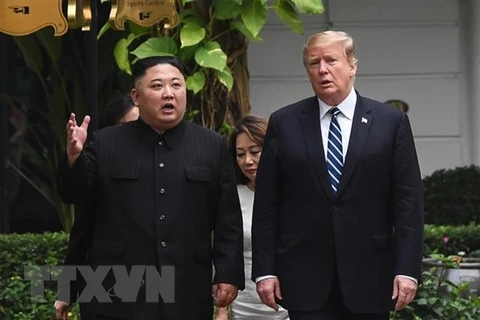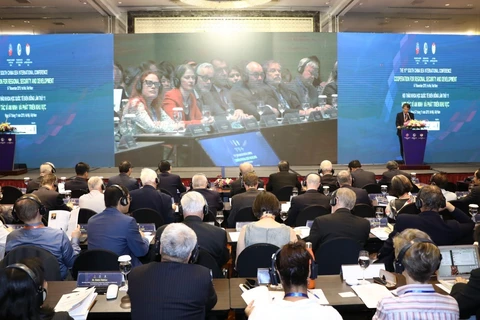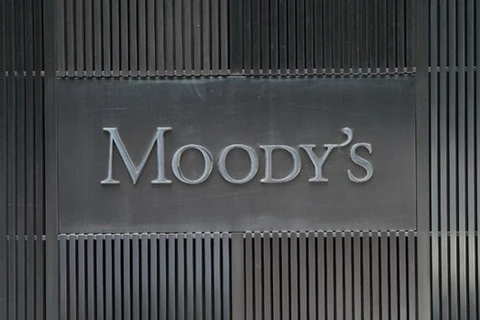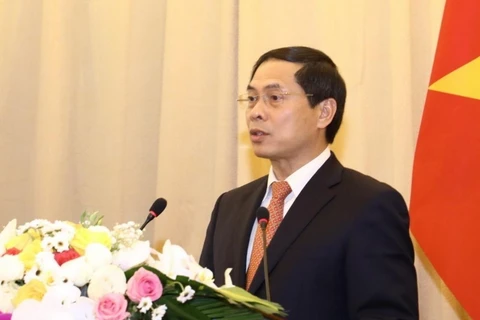 US and Chinese flags are seen as US Secretary of State Mike Pompeo and Chinese Foreign Minister Wang Yi meet in Washington, DC in May 2018. (Photo: AFP)
US and Chinese flags are seen as US Secretary of State Mike Pompeo and Chinese Foreign Minister Wang Yi meet in Washington, DC in May 2018. (Photo: AFP)Hanoi (VNA) – Below are the top 10 world events of 2019 voted by the Vietnam News Agency.
1. US – China strategic competition intensifies
Strategic competition between the world’s two major powers – the US and China – has become fiercer than ever in various areas, from trade to technology and military. The threat of a currency war has risen after the US accused China of manipulating its currency.
The US-China tensions have had severe impacts on the global economy and created more risks for emerging markets. Though multiple rounds of negotiations were held, the two sides have yet to reach a final deal to ease the tensions.
2. Complicated developments in the East Sea spark international concern
On July 4, Chinese survey vessel Haiyang Dizhi 8 and its escorts entered Vietnam’s exclusive economic zone (EEZ) and continental shelf in the East Sea, seriously violating international law and Vietnam’s sovereignty rights and jurisdiction.
Chinese survey ships have also repeatedly encroached upon the EEZ and continental shelf of other countries bordering the East Sea and obstructed their legal oil and gas activities. The international community strongly criticised China’s unilateral actions which had eroded trust and threatened regional peace, security and stability.
3. The UK’s bumpy road to Brexit
 The European Union flag and the Union Jack flag are seen outside the Houses of Parliament in London, Britain. (Photo: Xinhua/VNA)
The European Union flag and the Union Jack flag are seen outside the Houses of Parliament in London, Britain. (Photo: Xinhua/VNA)
The Conservative Party’s resounding victory in the December 12 general election has increased the possibility of the UK to leave the EU on January 31 next year after repeated delays. In his first speech after his party won, Prime Minister Boris Johnson vowed to do his best to get Brexit done while EU leaders said they were ready for the next steps.
An earlier withdrawal agreement was rejected three times by the British House of Commons, leading to the resignation of PM Theresa May. Johnson requested an EU extension of the Brexit deadline until January 31, 2020 and demanded a snap election on December 12 to avoid a no-deal Brexit.
4. US Federal Reserve makes first interest rate cut in 11 years
On July 31, the FED lowered its benchmark interest rate by 0.25 percentage points to a range of 2 – 2.25 percent, the first cut since the global financial crisis in 2008, to respond to the uncertain economic outlook. It continued to cut interest rates twice, on September 18 and October 30, down to 1.5 – 1.75 percent and then left them unchanged through the remainder of 2019.
Major central banks around the world, including the Bank of Japan (BOJ) and the European Central Bank (ECB), also made similar moves, sending their rates to historic lows, even below zero, to spur economic growth and prevent a recession.
5. Middle East tensions grow over US policy reversal
The situation in the Middle East has become unpredictable after the US accused Iran of being behind attacks on fuel tankers in the Gulf and two major oil refineries in Saudi Arabia and imposed more sanctions on Tehran.
The US also added fuel to the fire by recognising the Golan Heights as part of Israel, supporting Israeli settlements in the West Bank and ordering all US troops to withdraw from northern Syria.
6. Waves of demonstrations cause political and social unrest
 Rioters set fire at street in Sai Wan Ho, south China's Hong Kong in November, 2019. (Photo: Xinhua/VNA)
Rioters set fire at street in Sai Wan Ho, south China's Hong Kong in November, 2019. (Photo: Xinhua/VNA)
The lengthy demonstrations in Hong Kong (China) against an extradition bill have turned into riots, pushing the special administrative region to the brink of socio-economic crisis.
Meanwhile, challenges in politics, economics and social inequality have fueled widespread protests in parts of Europe, the Middle East and Latin America, causing instability in some countries.
7. Climate change and alarming plastic waste pollution
The Earth experienced the hottest June in 140 years. The temperatures set all time highs during the summer in Europe while Australia also reported record temperatures. Wildfires caused severe damage to the Amazon rainforest, which is dubbed the lungs of the Earth.
Meanwhile, plastic waste pollution reached an alarming 13 million tonnes dumped into the oceans every year, causing the deaths of about 1.5 million marine animals. Massive rallies took place across the globe to demand governments take more concrete actions to curb climate change and protect the environment.
However, at the 2019 UN Climate Change Conference, known as COP25, in Spain, participating countries failed to reach a deal on the Paris Agreement implementation roadmap while the US officially withdrew from the agreement.
8. Talks on the Regional Comprehensive Economic Partnership (RCEP) conclude
Ten ASEAN nations and five partner countries – Australia, China, Japan, the Republic of Korea and New Zealand – concluded text-based negotiations on the RCEP during the 35th ASEAN Summit in Bangkok, Thailand on November 4.
It marked a significant milestone in the international economic integration against the backdrop of rising protectionism that is hindering globalisation. The member countries pledged to soon finish their required legal reviews for the deal to be signed in 2020.
9. Global fight against “fake news”
Twenty countries, including France, Britain and India, signed an agreement on September 26 that aims to stop the spread of fake news online while many countries, including Singapore and Russia, have adopted fake news laws.
In the wake of growing pressure from various countries, leading social media platforms like Facebook, Google and Twitter have taken multiple measures to control and prevent fake news.
10. First ever black hole image released
The Event Horizon Telescope Collaboration on April 10 released the first ever picture of a black hole. The black hole, that is 6.6 billion times bigger than the Sun, was found in a distant galaxy called M87, about 55 million light-years from the Earth.
It was captured by a global network of eight telescopes, from Hawaii (the US) and Atacama (Chile) to the South Pole and Europe. The historic discovery is said to confirm Albert Einstein’s theory of general relativity./.
2. Complicated developments in the East Sea spark international concern
On July 4, Chinese survey vessel Haiyang Dizhi 8 and its escorts entered Vietnam’s exclusive economic zone (EEZ) and continental shelf in the East Sea, seriously violating international law and Vietnam’s sovereignty rights and jurisdiction.
Chinese survey ships have also repeatedly encroached upon the EEZ and continental shelf of other countries bordering the East Sea and obstructed their legal oil and gas activities. The international community strongly criticised China’s unilateral actions which had eroded trust and threatened regional peace, security and stability.
3. The UK’s bumpy road to Brexit
 The European Union flag and the Union Jack flag are seen outside the Houses of Parliament in London, Britain. (Photo: Xinhua/VNA)
The European Union flag and the Union Jack flag are seen outside the Houses of Parliament in London, Britain. (Photo: Xinhua/VNA) The Conservative Party’s resounding victory in the December 12 general election has increased the possibility of the UK to leave the EU on January 31 next year after repeated delays. In his first speech after his party won, Prime Minister Boris Johnson vowed to do his best to get Brexit done while EU leaders said they were ready for the next steps.
An earlier withdrawal agreement was rejected three times by the British House of Commons, leading to the resignation of PM Theresa May. Johnson requested an EU extension of the Brexit deadline until January 31, 2020 and demanded a snap election on December 12 to avoid a no-deal Brexit.
4. US Federal Reserve makes first interest rate cut in 11 years
On July 31, the FED lowered its benchmark interest rate by 0.25 percentage points to a range of 2 – 2.25 percent, the first cut since the global financial crisis in 2008, to respond to the uncertain economic outlook. It continued to cut interest rates twice, on September 18 and October 30, down to 1.5 – 1.75 percent and then left them unchanged through the remainder of 2019.
Major central banks around the world, including the Bank of Japan (BOJ) and the European Central Bank (ECB), also made similar moves, sending their rates to historic lows, even below zero, to spur economic growth and prevent a recession.
5. Middle East tensions grow over US policy reversal
The situation in the Middle East has become unpredictable after the US accused Iran of being behind attacks on fuel tankers in the Gulf and two major oil refineries in Saudi Arabia and imposed more sanctions on Tehran.
The US also added fuel to the fire by recognising the Golan Heights as part of Israel, supporting Israeli settlements in the West Bank and ordering all US troops to withdraw from northern Syria.
6. Waves of demonstrations cause political and social unrest
 Rioters set fire at street in Sai Wan Ho, south China's Hong Kong in November, 2019. (Photo: Xinhua/VNA)
Rioters set fire at street in Sai Wan Ho, south China's Hong Kong in November, 2019. (Photo: Xinhua/VNA)The lengthy demonstrations in Hong Kong (China) against an extradition bill have turned into riots, pushing the special administrative region to the brink of socio-economic crisis.
Meanwhile, challenges in politics, economics and social inequality have fueled widespread protests in parts of Europe, the Middle East and Latin America, causing instability in some countries.
7. Climate change and alarming plastic waste pollution
The Earth experienced the hottest June in 140 years. The temperatures set all time highs during the summer in Europe while Australia also reported record temperatures. Wildfires caused severe damage to the Amazon rainforest, which is dubbed the lungs of the Earth.
Meanwhile, plastic waste pollution reached an alarming 13 million tonnes dumped into the oceans every year, causing the deaths of about 1.5 million marine animals. Massive rallies took place across the globe to demand governments take more concrete actions to curb climate change and protect the environment.
However, at the 2019 UN Climate Change Conference, known as COP25, in Spain, participating countries failed to reach a deal on the Paris Agreement implementation roadmap while the US officially withdrew from the agreement.
8. Talks on the Regional Comprehensive Economic Partnership (RCEP) conclude
Ten ASEAN nations and five partner countries – Australia, China, Japan, the Republic of Korea and New Zealand – concluded text-based negotiations on the RCEP during the 35th ASEAN Summit in Bangkok, Thailand on November 4.
It marked a significant milestone in the international economic integration against the backdrop of rising protectionism that is hindering globalisation. The member countries pledged to soon finish their required legal reviews for the deal to be signed in 2020.
9. Global fight against “fake news”
Twenty countries, including France, Britain and India, signed an agreement on September 26 that aims to stop the spread of fake news online while many countries, including Singapore and Russia, have adopted fake news laws.
In the wake of growing pressure from various countries, leading social media platforms like Facebook, Google and Twitter have taken multiple measures to control and prevent fake news.
10. First ever black hole image released
The Event Horizon Telescope Collaboration on April 10 released the first ever picture of a black hole. The black hole, that is 6.6 billion times bigger than the Sun, was found in a distant galaxy called M87, about 55 million light-years from the Earth.
It was captured by a global network of eight telescopes, from Hawaii (the US) and Atacama (Chile) to the South Pole and Europe. The historic discovery is said to confirm Albert Einstein’s theory of general relativity./.
VNA























